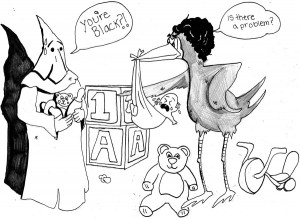Equality trumps patient choice in hospital case
With a twice-elected black president leading the country and increasing diversity in America’s communities, the move toward a world void of racism, sexism and other –isms seems to loom in the near future.
Sadly, however, racism continues to persist in appallingly boorish ways, even in places where such behavior should be the last of one’s concerns.
A recent lawsuit discovered by the media this past weekend revealed a situation between a black nurse named Tonya Battle and her workplace of 25 years, Hurley Medical Hospital in Flint, Mich. Battle was prohibited from caring for an infant patient based on the father’s request that no black people be around the child, according to The Huffington Post. The father also apparently showed the nurse’s supervisor “a swastika of some kind,” according to Battle, who spoke on the nationally syndicated Tom Joyner Morning Show. Battle was allegedly told by her supervisor that the father’s request was granted.
Though Hurley Medical later rejected the father’s wishes, the hospital administration honored his request for more than a month. Battle is now filing for “compensatory damages for the emotional stress and harm to her reputation,” according to The Huffington Post.
The hospital’s response? A “no comment” statement.
There have been strong reactions on both sides. The supporters of the hospital’s initial decision claim a right to prudence — that it was defusing the situation from escalating to dangerous heights. What if the man had been violent about a denial of request? Shouldn’t the hospital’s security and the patient, as well as employee rights, be a priority?
Despite the unequivocal “yes” to both questions, that does not merit such an allowance of blatant racism.
Some have also criticized the suit, saying that it is a matter of principle regarding patient preferences more than the pure issue of race. But the hospital should have acted with integrity and simply said no to such an obvious form of discrimination.
According to several sources, the note that Battle found on her clipboard the morning after the request said that no African Americans to tend to the baby — a direct attack on race and not on an issue with character or conduct, which are legitimate concerns when assessing an employee. It was a man taking issue with a caregiver’s skin color. It was a direct attack on the hospital’s own employee, and yet the hospital honored it.
Though the decision to grant the request can easily be portrayed as a decision made with ultimate consideration for the patient, when such deep personal offense is taken to account it becomes a bigger issue altogether. According to court documents, Battle “was in disbelief
that she was so egregiously discriminated against based on her race and re-assigned.”
Yes, it is legal for a patient to request specific professionals for treatment, but when it infringes upon someone’s right to be treated as an equal human being, that’s taking it too far. Even if it wasn’t a request to drop Battle’s duties as a nurse, the reassignment on racial grounds cannot be taken lightly — legally, or more importantly, ethically. Hurley Medical is not only charged with the responsibility of following the Constitution as a public hospital but also to treat all employees with respect and dignity. It’s clear that it failed to do so in this situation.
An event such as this seems shocking in this day and age; in Battle’s past 25 years working for the hospital, she did not contend with such an issue. But without a doubt, this won’t be the last time a case like this appears.
Hopefully, the lawsuit’s outcome will give hope to a future beyond racism and the willingness to acquiesce to it. One can only wish that this game of one-step-forward, two-steps-back meets its end soon.
Valerie Yu is a freshman majoring in biological sciences and English. Her column “Heart of the Matter” runs Fridays.


I felt that the cartoon was more offensive than the grammar in the article or is that just me?
I find it hard to believe that you’re majoring in both BISC and English. Your op-ed contains numerous grammatical errors and your understanding of how health care is delivered is naive. Patient autonomy comes first; doctors merely provide a service. If you are interested in medicine, I would hope that you study harder during your time at USC.